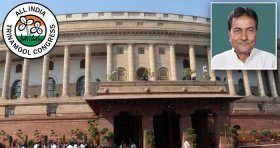March 27, 2017
Idris Ali speaks on The Mental Healthcare Bill, 2016

FULL TRANSCRIPT
While participating in the discussion on The Mental Healthcare Bill, 2016, passed by the Rajya Sabha, and now been amended as The Mental Healthcare Bill, 2017, I would like to say that though public health is a State subject, with the financial constraints, it is next to impossible for the States of the country to implement the provisions of this Bill.
India is the worst-affected country in the world with regard to depression, having more than 6 crore sufferers. The data of the UN agency shows that the number of people living with depression across the world has increased by 18.4 per cent between 2005 and 2015. In India, depression and mental anxiety disorders prevail in over 5 per cent women and in over 4 per cent men.
Apart from that, about 4 crore people in India suffered from anxiety disorders in 2015, with a prevalence rate of 3 per cent. It is a fact that 78 per cent of global suicides occurred due to mental instability and 1 per cent commits suicide every 40 seconds.
The most alarming thing is that a study indicated an average of 20.5 per cent mental health morbidity in older adults with 17.3 per cent in urban areas and 23.6 per cent in rural areas. Accordingly, it is found that, at present, 18 million older adults, consisting of a population of 83.58 million, are suffering from mental health problems in India.
In 1982, the Government launched the National Mental Health Programme (NMHP) and in 2014, the Health Ministry came up with a revised National Mental Health Policy to treat the elderly, affected by Alzheimer’s and other dementias, Parkinson’s disease, depression and psychogeriatric disorders.
The population of older adults in India is growing: in 1951 it was 5.3 per cent, in 1981 it was 6 per cent, in 1991 it was 6.8 per cent, in 2001 it was 7.4 per cent and in 2006 it was 7.5 per cent. Thus it has been steadily rising and is projected to become 12.5 per cent in 2026; thus it is likely to become a challenge in the near future.
Surveys have found that depression still ranks as the most prevalent psychiatric illness of the aged. One out of every six older persons living in urban areas in India is not obtaining proper nutrition, one out of every three older persons does not obtain sufficient healthcare and medicines, and one out of every two older persons does not receive due respect or good conduct from family members or people in general.
The Indian Council of Medical Research (ICMR), using sound methodology, has revealed that 17.3 per cent of urban and 23.6 per cent of rural older adults, that is, those aged 60 years and above, are suffering from syndromal mental health problems and 4.2 per cent of urban and 2.5 per cent of rural older adults are suffering from subsyndromal mental health problems. According to the Global Burden of Disease Study (GBD), although the world proportion of people of 60 years and above is smaller now, by 2030 the absolute number of older adults is likely to be the highest in India, with enormous mental health morbidity in older adults.
So, the Mental Healthcare Bill, 2017 is not just a health Bill but one which deals with a mixture of health and social care issues, and hence, we have to think differently to protect and promote speedy procedures of treatment and the rights of persons with mental illnesses.
Keeping in view making fruitful the objects of the Bill, we immediately require community-based mental healthcare by using the public health infrastructure and other resources of the primary health centres in the administrative structure to develop and monitor the progress of the programme in a centralised manner. To make it a successful project, we have to immediately set up psychiatry and psycho-orientation departments at all levels of health centres and hospitals in the country.
I therefore request the Central Government to ensure funds to State Governments for due implementation of this Bill and this Bill may kindly be included with the schemes of the Department of Health and Family Welfare which are under 100 per cent Central Government funding, before the situation gets out of the hand of the Government.
